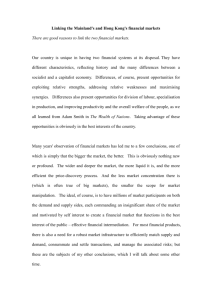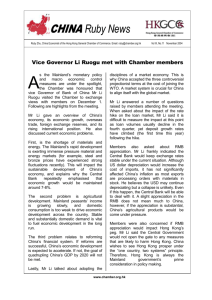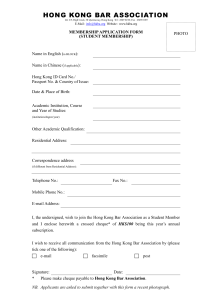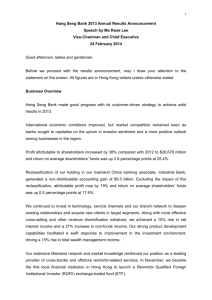Seven Pointers for Financial Market Development
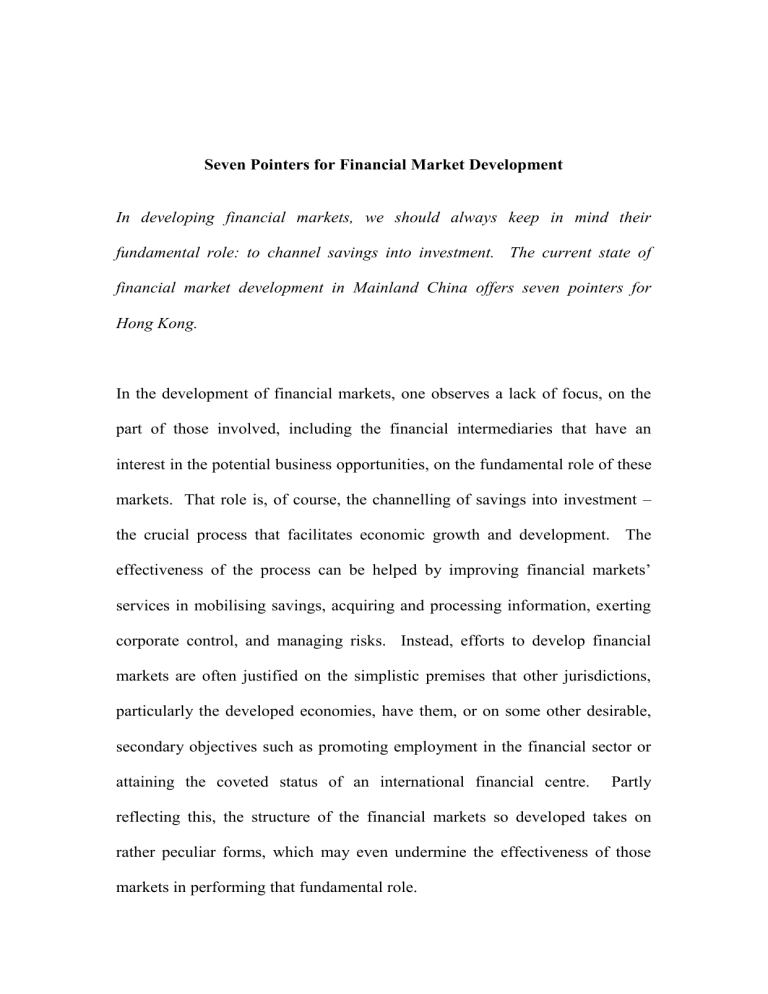
Seven Pointers for Financial Market Development
In developing financial markets, we should always keep in mind their fundamental role: to channel savings into investment. The current state of financial market development in Mainland China offers seven pointers for
Hong Kong.
In the development of financial markets, one observes a lack of focus, on the part of those involved, including the financial intermediaries that have an interest in the potential business opportunities, on the fundamental role of these markets. That role is, of course, the channelling of savings into investment – the crucial process that facilitates economic growth and development. The effectiveness of the process can be helped by improving financial markets’ services in mobilising savings, acquiring and processing information, exerting corporate control, and managing risks. Instead, efforts to develop financial markets are often justified on the simplistic premises that other jurisdictions, particularly the developed economies, have them, or on some other desirable, secondary objectives such as promoting employment in the financial sector or attaining the coveted status of an international financial centre. Partly reflecting this, the structure of the financial markets so developed takes on rather peculiar forms, which may even undermine the effectiveness of those markets in performing that fundamental role.
This is perhaps a reflection of political and economic reality rather than anyone being too short-sighted to appreciate the fundamental role of financial markets.
For example, the strength of domestic institutions, the size of the economy served by the financial market, and historical influences are among important factors that explain deficiencies in financial intermediation in some economies.
Indeed, there is always a need for compromise in order to get things done or started, and there is always the possibility as a next step to refine the structure in the light of changing circumstances. One interesting example concerns the evolution of the stock market in Hong Kong over the years. In the old days there were four stock exchanges in Hong Kong, probably justified on the basis of promoting free competition in the business, while the negative effects of market proliferation on market liquidity and therefore market efficiency were not of particular concern. There was also the period ahead of the market crash in 1987 and the controversial closure of the stock and futures exchanges because the structure allowed the private interests of the intermediaries to override the public interest. But we all learn from mistakes and mistakes provide opportunities for improvement. And so we now have a rather sophisticated stock market, which is, bearing in mind its fundamental role, providing quite an effective channel for financial intermediation, not only domestically but, increasingly, internationally.
In this connection, I am sure much thought is now being given to the further development of financial markets in Hong Kong and how we should maintain our status as an international financial centre, as required in the Basic Law. It is of strategic importance that in doing so, we should all have firmly in our minds the fundamental role of financial markets. And if we look around Hong
Kong in that focussed mentality, it would not be difficult to notice a few phenomena with implications for us:
First, with a savings rate estimated to be around 30% to 40%, there are large amounts of domestic savings on the Mainland to be mobilised and channelled into domestic investments.
Secondly, the efficiency of the financial systems in effecting financial intermediation in Mainland China is still relatively low, and the Mainland authorities are happy to embrace the presence of foreign financial institutions to improve efficiency.
Thirdly, because of the long history of exchange controls, there is considerable pent up demand from some of the domestic savings of the
Mainland for investment overseas, for the purpose of diversification or other reasons.
Fourthly, to sustain economic development, there is strong domestic fixed investment growth and therefore strong demand for funds.
Fifthly, the rapid economic growth and the high investment return rate on the Mainland are serving as a strong magnet for foreign savings, as
manifested in the abundance of foreign direct investments flowing into the
Mainland.
Sixthly, again because of exchange controls, there is much scope for international financial intermediation involving the Mainland (domestic savings to be invested overseas and foreign savings to be invested in the
Mainland) to be organised offshore.
Seventhly, the Mainland authorities appreciate well the benefits and risks of financial liberalisation, and the approach adopted is one of gradualism, requiring controlled experiments to be conducted and a suitable place to undertake them.
I believe these are the considerations that we should always bear in mind when positioning ourselves in the further development of our financial markets. This is particularly important in steering our discussions with the Mainland authorities so that the beneficial role that Hong Kong can play in satisfying the financial needs of the Mainland is also given attention, in addition to the need to help Hong Kong, which has been much emphasised.
Joseph Yam
11 November
